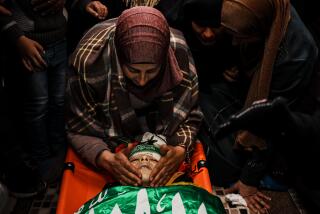At a Libya morgue, a father fears the worst
The mood on the front steps of the morgue at Tripoli’s Central Hospital is far from triumphal.
Every few minutes, a fearful resident, covering his mouth with a surgical mask, makes his way into the brick building filled with dozens of disfigured bodies decomposing in the August heat. And every few minutes, someone walks out, sobbing uncontrollably.
Omar Salem had already tried to go inside once Wednesday. But the smell drove him back. Now, as he stood outside, seeking to summon the courage to reopen the door, Salem described his plight to sympathetic bystanders.
Photos: The battle for Tripoli>
“I am looking for my son,” the crisply dressed 63-year-old engineer explained in near-flawless English. “He was standing around on the road and shot by the kataeb,” Moammar Kadafi’s dreaded militiamen.
“I’m sure he’s here,” Salem continued. “Because he was with his friend, and his friend is here.”
As Libyan rebels sought to tighten their grip over the capital, gunfire continued to resonate and the number of victims of Libya’s six-month revolution mounted. Doctors have reported at least 50 to 100 civilian deaths in recent days, and on Wednesday morning more than 50 new gunshot victims were being treated at the Central Hospital.
“We don’t even know how many people are stranded in their homes with wounds,” said Mahdi Swedani, a doctor. “Most of the dead bodies are still where the fighting was.”
Among the victims were people swept up in the conflict as rebel fighters poured into Tripoli in recent days, capturing Kadafi’s Bab Azizia compound on Tuesday and continuing to battle loyalists as they searched for the elusive 42-year leader.
Salem’s son Emir, 21, wasn’t particularly politically active when the uprising began. But like many of his generation, the second-year Fatah University student despised Kadafi, his father said. When word came that rebels were launching an offensive against the capital, Emir was among the many who headed into the streets.
Salem heard word from neighbors that Emir was shot early in the fighting, and he said he knew in his heart that his youngest son was dead. For three days he’d tried unsuccessfully to reach the morgue — unable to find a taxi and with no gas in his car — as the street fighting continued.
Finally, Salem ended up walking three miles, where he informed those milling outside the hospital: “I’m crying inside me.”
Some in the small crowd sought to console him. If his son was dead, they said, there was nothing to fear. He would be a martyr in the effort to bring about the downfall of the tyrant.
“It’s even more than worth the price of freedom,” said Khaled Abu Ajelah, 27, whose friend was among those killed in the battle for Kadafi’s fortress.
Salem watched grimly as others left the morgue in tears. He breathed quickly and deeply, a note of panic in each gasp for air.
Abdul Khaled Qader, 58, was among the many attempting to comfort him. Qader’s son Siraj, 20, was killed by a sniper as Kadafi loyalists roamed through the city, randomly shooting people, most likely in an attempt to prevent them from joining the rebellion.
The fathers had never met before, but it turned out that Siraj, a biology student, and Emir, a premed student, were friends at the university.
Despite the senselessness of his son’s death, Qader expressed a father’s pride. “He was a sacrifice for freedom,” he explained. “My son is dead. That’s life. At least it was for a good cause.”
Finally, Salem braced himself and went inside. All fell silent, including two rebel fighters who had commandeered an ambulance to drive around the city and pick up the wounded and the dead. The pair held off on their next mission to wait for the outcome of Salem’s search.
Minutes later, the latest mourning father was rushing out of the morgue.
“He’s been killed,” Salem declared, struggling to get the words out. “He’s been burned and shot, and burned up. But I recognized him. I recognized his body.”
“Please, excuse me,” he added, as he brushed past the crowd, moving toward the one man he knew would understand the heart of another whose promising son’s life has been cut short.
Salem sat down next to his new friend. And Qader put his hand on the fellow grieving father’s shoulder, just as he began to cry.
Photos: The battle for Tripoli
Special correspondent Ryma Marrouch contributed to this report.
More to Read
Start your day right
Sign up for Essential California for news, features and recommendations from the L.A. Times and beyond in your inbox six days a week.
You may occasionally receive promotional content from the Los Angeles Times.






